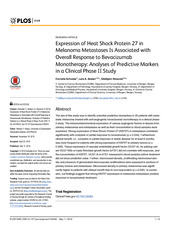Expression of Heat Shock Protein 27 in Melanoma Metastases Is Associated with Overall Response to Bevacizumab Monotherapy: Analyses of Predictive Markers in a Clinical Phase II Study
| dc.contributor.author | Schuster, Cornelia | en_US |
| dc.contributor.author | Akslen, Lars A. | en_US |
| dc.contributor.author | Straume, Oddbjørn | en_US |
| dc.date.accessioned | 2017-03-03T10:10:27Z | |
| dc.date.available | 2017-03-03T10:10:27Z | |
| dc.date.issued | 2016-05-11 | |
| dc.identifier.issn | 1932-6203 | |
| dc.identifier.uri | https://hdl.handle.net/1956/15573 | |
| dc.description.abstract | The aim of this study was to identify potential predictive biomarkers in 35 patients with metastatic melanoma treated with anti-angiogenic bevacizumab monotherapy in a clinical phase II study. The immunohistochemical expression of various angiogenic factors in tissues from primary melanomas and metastases as well as their concentration in blood samples were examined. Strong expression of Heat Shock Protein 27 (HSP27) in metastases correlated significantly with complete or partial response to bevacizumab (p = 0.044). Furthermore, clinical benefit, i.e., complete or partial response or stable disease for at least 6 months, was more frequent in patients with strong expression of HSP27 in primary tumors (p = 0.046). Tissue expression of vascular endothelial growth factor (VEGF-A), its splicing variant VEGF165b or basic fibroblast growth factor (bFGF) did not correlate with response, and the concentration of HSP27, VEGF-A or bFGF measured in blood samples before treatment did not show predictive value. Further, microvessel density, proliferating microvessel density and presence of glomeruloid microvascular proliferations were assessed in sections of primary tumors and metastases. Microvessel density in primary melanomas was significantly higher in patients with clinical benefit than in non-responders (p = 0.042). In conclusion, our findings suggest that strong HSP27 expression in melanoma metastases predicts response to bevacizumab treatment. | en_US |
| dc.language.iso | eng | eng |
| dc.publisher | PLoS | eng |
| dc.relation.ispartof | <a href="http://hdl.handle.net/1956/15572" target="blank">Investigation of predictive markers in patients with metastatic melanoma treated with bevacizumab</a> | |
| dc.rights | This is an open access article distributed under the terms of the Creative Commons Attribution License, which permits unrestricted use, distribution, and reproduction in any medium, provided the original author and source are credited. | eng |
| dc.rights.uri | https://creativecommons.org/licenses/by/4.0/ | eng |
| dc.title | Expression of Heat Shock Protein 27 in Melanoma Metastases Is Associated with Overall Response to Bevacizumab Monotherapy: Analyses of Predictive Markers in a Clinical Phase II Study | en_US |
| dc.type | Journal article | |
| dc.description.version | publishedVersion | en_US |
| dc.rights.holder | Copyrigt 2016 Schuster et al. | |
| dc.source.articlenumber | e0155242 | |
| dc.identifier.doi | https://doi.org/10.1371/journal.pone.0155242 | |
| dc.source.journal | PLoS ONE | |
| dc.source.40 | 11 | |
| dc.source.14 | 5 | |
| dc.subject.nsi | VDP::Medisinske Fag: 700 | en_US |
Files in this item
This item appears in the following Collection(s)
Except where otherwise noted, this item's license is described as This is an open access article distributed under the terms of the Creative Commons Attribution License, which permits unrestricted use, distribution, and reproduction in any medium, provided the original author and source are credited.

